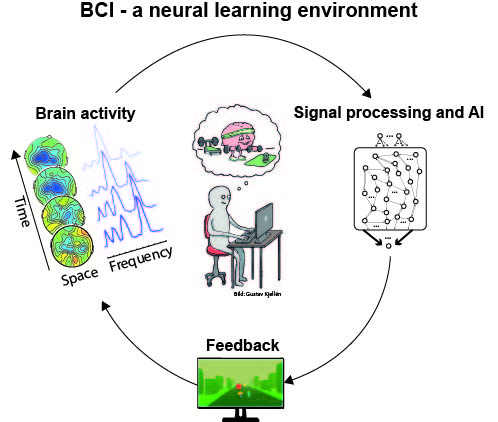Neuroengineering
Focus:
The neuroengineering group focuses on advancing Brain-Machine Interface (BMI) technology. We are specifically interested in closed-loop neurofeedback systems in its interaction with the brain, thus including both systems engineering and neuroscience.
In a closed-loop Brain-Machine Interface (BMI), the brain is interfaced in real time to a machine (often a computer, called BCI) through feedback that reflects ongoing brain activity (i.e. neurofeedback, NFB) [1]. In other words, through NFB, often displayed visually on a computer screen, BCI users can voluntarily control specific features of their own brain activity (i.e. neural self-regulation). This promotes a neural learning environment that stimulates cortical plasticity [2]. As such, BCIs have been shown to induce both short- and long-term modulations in the brain activity [2]. However, for BCIs to be interesting from a therapeutic aspect, these activity modulations need to translate into behavioral improvements. In this respect, several BCI studies show promise in restoring motor function following neurological trauma, such as a stroke [3], and in improving pathological symptoms in people with cognitive impairments, such as Attention-Deficit Hyperactivity Disorder (ADHD) [4].

The neuroengineering team uses non-invasive recording techniques including eye-tracking, electroencephalogram (EEG) and functional near-infrared spectroscopy (fNIRS) to advance BCI technology and study closed-loop interaction effects. We are interested in both the biological and machine-side of the BCI system as well as the dynamic interaction between the two. From the machine perspective, we apply advanced signal processing and AI to investigate how information encoded in the brain activity can be extracted in real time. From the biological perspective, we are interested in both how human learning of neural self-regulation can be improved and how BMIs can trigger brain plasticity in a controlled manner.
References:
[1] R. Sitaram et al., ‘Closed-loop brain training: the science of neurofeedback’, Nat. Rev. Neurosci., vol. 18, no. 2, pp. 86–100, 2017
[2] H. J. Engelbregt et al., ‘Short and long-term effects of sham-controlled prefrontal EEG-neurofeedback training in healthy subjects’, Clin Neurophysiol, vol. 127, no. 4, pp. 1931–1937, Apr. 2016
[3] M. A. Cervera et al., ‘Brain-computer interfaces for post-stroke motor rehabilitation: a meta-analysis’, Annals of Clinical and Translational Neurology, vol. 5, no. 5, pp. 651–663, 2018
[4] M. Arns, C. K. Conners, and H. C. Kraemer, ‘A decade of EEG Theta/Beta Ratio Research in ADHD: a meta-analysis’, J Atten Disord, vol. 17, no. 5, pp. 374–383, Jul. 2013
Stability of the Default Mode Network estimated from electroencephalogram (Nov 2025) Joana Silva, Elmeri Syrjänen, Elaine Åstrand THe 12th International IEEE EMBS Conference of Neural Engineering (IEEE NER'25)
DAT (Dec 2024) Ali Asghar Sharifi, Ali Zoljodi , Masoud Daneshtalab Sensors (MDPI Sensors)
TrajectoryNAS (Sep 2024) Ali Asghar Sharifi, Ali Zoljodi , Masoud Daneshtalab Sensors (SENSC9)
Contrastive Learning for Lane Detection via cross-similarity (Sep 2024) Ali Zoljodi , Sadegh Abadijou , Mina Alibeigi , Masoud Daneshtalab Pattern Recognition (PR)
Pupil Diameter Does Not Covary with Learning During Single-Session Neurofeedback Training (Aug 2024) Joana Silva, Elmeri Syrjänen, Elaine Åstrand IEEE EMBS, the 46th Annual International Conference of the IEEE Engineering in Medicine and Biology Society 2024 (EMBS)
Individual temporal and spatial dynamics of learning to control central Beta activity in neurofeedback training (Aug 2023) Elmeri Syrjänen, Joana Silva, Elaine Åstrand 2023 11th International IEEE/EMBS Conference on Neural Engineering (NER) (NER)


Elaine Åstrand, Associate Professor,Senior Lecturer
Email: elaine.astrand@mdu.seRoom: U1-130
Phone: 021-103125

